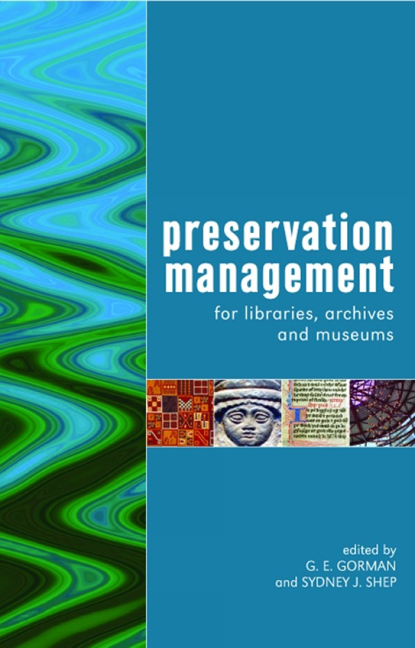Book contents
- Frontmatter
- Contents
- About the contributors
- Introduction
- 1 Managing the documentary heritage: issues for the present and future
- 2 Preservation policy and planning
- 3 Intangible heritage: museums and preservation
- 4 Surrogacy and the artefact
- 5 Moving with the times in search of permanence
- 6 Valuation model for paper conservation research: a new approach for setting research priorities
- 7 Preservation of audiovisual media: traditional to interactive formats
- 8 Challenges of managing the digitally born artefact
- 9 Preserving cultural heritage in times of conflict
- 10 Access and the social contract in memory institutions
- 11 Redefining ‘the collection’ in the 21st century
- Index
10 - Access and the social contract in memory institutions
Published online by Cambridge University Press: 08 June 2018
- Frontmatter
- Contents
- About the contributors
- Introduction
- 1 Managing the documentary heritage: issues for the present and future
- 2 Preservation policy and planning
- 3 Intangible heritage: museums and preservation
- 4 Surrogacy and the artefact
- 5 Moving with the times in search of permanence
- 6 Valuation model for paper conservation research: a new approach for setting research priorities
- 7 Preservation of audiovisual media: traditional to interactive formats
- 8 Challenges of managing the digitally born artefact
- 9 Preserving cultural heritage in times of conflict
- 10 Access and the social contract in memory institutions
- 11 Redefining ‘the collection’ in the 21st century
- Index
Summary
Introduction
This chapter charts some of the changes that are currently taking place in the provision of access to information, and highlights the need to ensure that new methods of access do not ignore the need to ensure access for future generations as well as the present. Much of the current attention to access represents improvements in the absolute right to information, but there is a danger that good preservation management, particularly in the electronic world, is ignored. These improvements include: the absolute right to information; the obligation to enable information retrieval; the requirement that publicly funded and government-funded projects should facilitate access; the growing issues surrounding electronic access and the real needs of the end-user; the social agenda for access to information; and the importance of making the end-user comfortable with accessing information, be it in a traditional or virtual format.
Access and the social contract in publicly funded Institutions
In considering these issues some definitions and parameters would not go amiss. Access to information is perhaps the simplest of the concepts, but putting that together with ‘the social contract’ and ‘publicly funded institutions’ brings in more complex issues. Rousseau's proposition of the equality of all relates in this instance to the right of access to information for all, equally – this is an inalienable right. The role of publicly funded institutions, the memory institutions of the chapter title, is to respond to that inalienable right. I would argue further that the provision of public resources (i.e., resources owned by all in Rousseau's terms) to libraries, museums and archives (defined as memory institutions) confers a social as well as a moral obligation on them to facilitate access to the information they hold, and that this contract is only slowly being recognized by both sides. Memory institutions have, for many years, collected, preserved and made material available, but often on their own terms; the priorities have frequently been those of the organization rather than those of the public. Curators, archivists and librarians have had the content and care of collections at the central core of their responsibilities, stressing the academic and holistic qualities of their holdings, acting in some cases as fortresses into which only the brave dared venture.
- Type
- Chapter
- Information
- Preservation Management for Libraries, Archives and Museums , pp. 166 - 181Publisher: FacetPrint publication year: 2006
- 2
- Cited by



